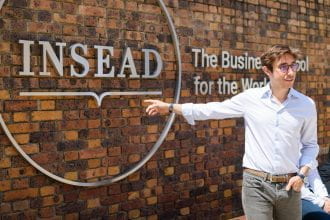
Hurricane Mitch devastated Central America in October 1998. It was the second-deadliest Atlantic hurricane on record, causing over 11,000 fatalities. Shortly afterwards, IFRC, the world’s largest humanitarian network, asked Luk Van Wassenhove, INSEAD Emeritus Professor of Technology and Operations Management, for assistance. The hurricane had overwhelmed the disaster response and IFRC management was keen to draw on Van Wassenhove’s experience in applying scientific models and tools to address complex logistical challenges in the humanitarian sector. Van Wassenhove helped IFRC decentralise its supply chain and position relief teams in carefully located warehouses, hastening response times and enhancing relief efforts. This is one of many examples of how Van Wassenhove’s extensive research has been applied to tackle complex real world challenges.
Our new Research Impact Narrative Series showcases examples of INSEAD faculty who are helping to solve major challenges faced by business and by society
Examples of our faculty’s research impact are now featured in a new website with downloadable and printable PDFs as well as on the INSEAD Knowledge Podcast. Alumni interested in promoting the work of these professors on their social media platforms can do so using the INSEAD Advocacy Toolkit, which contains web cards and suggested text for your posts.
This series came about as part of INSEAD’s 60th anniversary. As we reflected on the school’s history, it was clear that the leading-edge management knowledge that our faculty consistently produce has revolutionised thinking in various disciplines, from operations management to marketing to entrepreneurship.

Professor Van Wassenhove, for example, is an academic leader in sustainable innovation and a pioneer of reverse logistics, the notion that companies can build products to eventually be taken back after use and reproduced. His business models for closed-loop supply chains played a key role in the European Union’s electrical waste directive (WEEE Directive) and underpin concepts at the heart of the Circular Economy. His research relates closely to the UN Sustainable Development Goals (SDGs): his humanitarian logistics work tackles ‘No Poverty’ and ‘Zero Hunger’ (SDGs 1 & 2), while working on closed-loop supply chains addresses ‘Responsible Consumption and Production’ (SDG 12).
Solving pressing problems in the business world
Professor Van Wassenhove’s colleague, Paddy Padmanabhan, The Unilever Chaired Professor of Marketing, took on an age-old problem: the bullwhip effect in supply chains. The phenomenon, whereby small fluctuations in retail demand cause large fluctuations in demand further up the supply chain, caused headaches for suppliers and distributors the world over. Professor Padmanabhan wrote one of the most influential papers ever published in Management Science that showed how to alleviate the effect with collaboration and information-sharing strategies.
Another age-old problem for many businesses that continues to confront them today is deciding whether a job is best kept in-house or outsourced. Professor Erin Anderson’s research opened up new horizons for transaction cost analysis and provided crucial models to companies to help them make the ever-pressing decision of whether to “make” or “buy”. Anderson was the John H. Loudon Chaired Professor of International Management and Professor of Marketing at INSEAD upon her passing in 2007.
Gabriel Szulanski, The INSEAD Chaired Professor in Strategy, is recognised as a world leading authority on inter-firm transfer of best practice. Contrary to what many people think, transferring knowledge from one business unit to another is a major challenge. Early in his career, Professor Szulanski’s research showed that the transfer of knowledge was not a single act of communication, as widely perceived, but an intricate process. This has helped companies realise cost savings and enhance competitiveness.
Ioana Popescu, Professor of Decision Sciences, is one of the most influential and innovative scholars in the field of revenue management. Her creative approach to understanding how consumers think and why they make the choices they do has had implications on pricing models globally. She challenged the idea that prices were generally fixed and revenue management was largely a matter of inventory. Her unique ability to meld the fields of decision-making, psychology and operations management helped firms calculate optimal prices and allocate capacity with much greater precision.
Henrich Greve, The Rudolf and Valeria Maag Chaired Professor in Entrepreneurship, is described as “one of the most remarkable organisational theorists of his generation”. He discovered that firms do not change because of their performance alone, but because of aspirations as well. This upended prevailing thought in organisational change.
And Atalay Atasu, Professor of Technology and Operations Management and the Bianca and James Pitt Chair in Environmental Sustainability, like Luk Van Wassenhove, works in the field of closed-loop supply chains. By working with companies and solving practical challenges of competition and consumer behaviour, Professsor Atasu has produced findings that have transcended academia and been applied extensively in the real world.
Challenging conventions, shaping the future
A striking aspect is how relevant INSEAD’s research is and how widely it is applied to today’s challenges. Our research is a big part of what makes us a renowned academic institution. Being in the vanguard of new management knowledge, the school attracts and inspires world class faculty, students, alumni, executive learners and partners to challenge conventional thinking and positively impact business and society. A recent €60 million gift, the biggest in our history, will partly finance research, and stands as a ringing endorsement of our faculty’s ability to create relevant, timely and timeless management knowledge.


